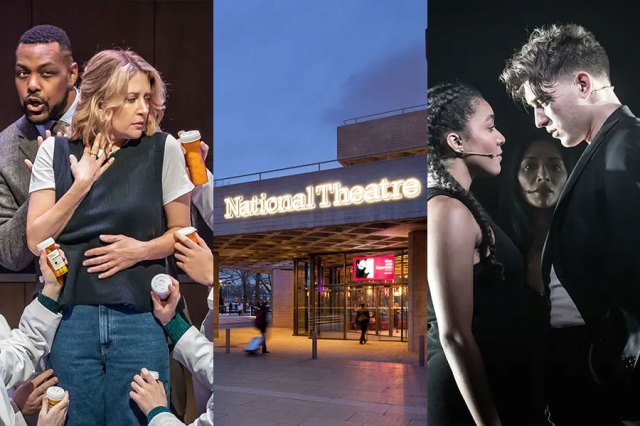Sarah Crompton on the 2024 Olivier Awards nominations: Rising and established talent side by side
The nominations were revealed today

Awards are all about momentum as well as excellence. Just ask Christopher Nolan’s Oppenheimer which has just won seven Oscars! It was a billion-dollar movie that caught the public imagination and brought audiences back to cinemas; it opened in the middle of the year; it was full of epic performances; there was a sense that this was Nolan’s time.
I don’t want to push things too far with this analogy, but I’d be surprised if at this year’s Olivier Awards ceremony on 14 April, Jamie Lloyd’s Sunset Boulevard doesn’t come through in the majority of the 11 categories it has been nominated – and perhaps for the same reasons. It feels of its moment, a fulfilment of the style that Lloyd has been developing through plays such as The Effect (also nominated for Best Revival).
It’s brought to wonderful, thrilling, noirish life by a terrific cast led by Nicole Scherzinger and recognised in many acting categories. It feels like a show for now and I suspect that its only challenger for many of the more technical Oliviers will be Stranger Things: The First Shadow, another piece of theatrical magic that has attracted young and enthusiastic audiences.
In the directing category, this perhaps bodes badly for Rupert Goold, whose energy and imagination did so much to bring James Graham’s Dear England to such vivid life. And for Sam Mendes whose cool, cinematic style lent The Motive and the Cue by Jack Thorne its elegant aplomb.
But how wonderful for the National Theatre (which has the most Olivier nominations overall, with a whopping 15 mentions) that in the Best New Play category these two works are joined by Beth Steele’s superbly funny and insightful family saga Till the Stars Come Down, which also originated on the Southbank. Only Jez Butterworth’s The Hills of California, another play about sisters, challenges the National’s hegemony in this category.
It’s quite an achievement for artistic director Rufus Norris – recently the recipient of the WhatsOnStage special award for Services to UK Theatre – who has reinvigorated new writing in a place where it has often struggled. Both Dear England and Till the Stars Come Down look at the state of the nation, one through the prism of a football team and the other through a family. The Motive and the Cue is a love letter to theatre itself. All are big, bold, original dramas that have engaged audiences – and, particularly in the case of Dear England, encouraged people who wouldn’t necessarily think that theatre is for them, to give it a try.
Elsewhere, the Olivier Awards this year offer a very starry list, with Sarah Jessica Parker, Sarah Snook and David Tennant, all probably best known for their work on screen (in Sex and the City, Succession, and Doctor Who respectively) adding their lustre to powerful line-ups. The sheer quality on offer, in such a variety of roles, makes all the acting categories unusually difficult to call.
How will David Tennant’s devastatingly direct Macbeth fare when set alongside exceptional work from Andrew Scott (in a one-man Vanya), James Norton (in the gruelling A Little Life), or Joseph Fiennes’s uncanny reading of Gareth Southgate in Dear England and Mark Gatiss’s moving version of John Gielgud in The Motive and the Cue? I’d love Gatiss to win because I am not sure he can ever be better, but every single one of those performances deserves a prize.
It’s the same for Best Actress where Laura Donnelly for The Hills of California, and Parker for her comic turns in Plaza Suite, come up against a wrenching Medea from Sophie Okonedo, and two exceptional solo performances from Sheridan Smith in Shirley Valentine and Snook in The Picture of Dorian Gray. I suspect the sheer technological dazzle of Dorian Gray and her multiple performances within it will bring Snook the Olivier, but honestly, who knows?
In the supporting categories, there’s a sense that the Olivier judges have been looking hard at rising as well as established talent. It’s lovely that Michael Longhurst’s Donmar production of Next to Normal, an exceptional example of ensemble acting, has garnered three performance nominations for Caissie Levy (Best Actress in a Musical), Eleanor Worthington-Cox (Supporting Actress in a Musical) and Jack Wolfe (Supporting Actor in a Musical).
I was happy too to see Tanya Reynolds recognised in the Supporting Actress category for her subtle work on the (generally under-valued, in my view) A Mirror at the Almeida, alongside a heart-breaking posthumous nomination for Haydn Gwynne for When Winston Went to War with the Wireless.
Looking across the categories, it’s inevitable that individual theatregoers will be able to argue with some of the Olivier choices, but every single one reveals the sheer strength of the work being produced, often against the odds, on our stages. In Best New Musical for example, voters have to chose between Operation Mincemeat, The Little Big Things, Next to Normal and A Strange Loop. What a range of work! What a choice!
It’s the same with the often-maligned (and clumsily named) Best Entertainment or Comedy Play category where the lovely Sondheim tribute Old Friends, finds itself up against the innovative Stranger Things, the irreverent Vardy V Rooney: The Wagatha Christie Trial and the clever Dario Fo revival Accidental Death of an Anarchist.
Across the board, it feels like a strong, rich year. When the winners are revealed on 14 April, it may be that the juggernauts will triumph, but the nominations are a welcome reminder of the wealth of choice that London theatre can offer.














